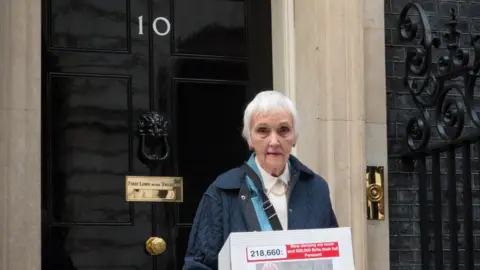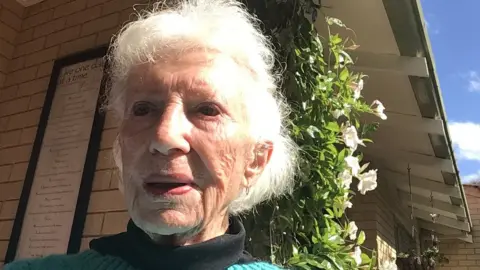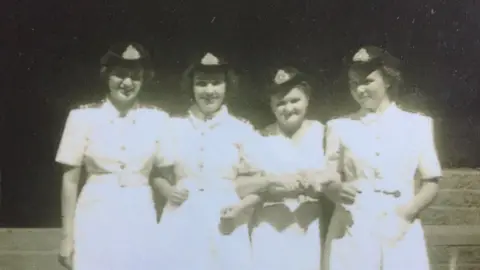VE Day anniversary: Calls to end frozen pensions for WW2 veterans abroad
 Campaign to End Frozen Pensions
Campaign to End Frozen PensionsCampaigners are calling on the government to restore full state pensions to World War Two veterans who moved abroad after retirement.
More than 500,000 UK state pensioners have had their pensions frozen after moving overseas, including an estimated 100,000 who served in the Armed Forces.
The government says it increases the value of pensions in other countries where it is legally required to do so.
It comes as Britain marks the 75th anniversary of VE Day on Friday.
The veterans have been called the "forgotten heroes" - an ever-dwindling band who feel they have been let down by the country they served.
Many left the UK to join families who had settled in other Commonwealth countries like Australia and Canada.
Inez Minc worked as a nurse in field hospitals across Europe, tending to allied soldiers as well as German and Italian prisoners. She even treated an exhausted Field Marshal Bernard Montgomery towards the end of the war.
Now, aged 97, she recalls spending her VE Day entertaining the wounded in a Belgian hospital with performances of the tango and the Mexican hat dance.
But she has less to celebrate 75 years on.
Inez moved to Australia in 1986 with her husband after a career in nursing in the UK. It was only then that she found out her pension had been frozen.
If she were still living in the UK, she would be entitled to a state pension of £134.25 - but because she moved abroad, she only gets £40.13 a week.
 Inez Minc
Inez MincShe lives on her own near Perth, and is partially deaf and blind. In the past she has struggled with medical bills.
She said it was the injustice that "rankles", having paid taxes and national insurance in the UK for nearly all of her working life.
"To expect Australia to pick up the tab is a bit of a cheek," she said. Explaining the situation to her Australian friends made her feel "a little bit sad to be English", she added.
Anne Puckridge, 95, is more forthright. "I feel ashamed to be British", she said.
She served with the Armed Forces in India during WW2. After a full working life spent in the UK, she moved to Canada almost 20 years ago to be with her daughter.
Anne has had her pension frozen at £72.50 a week - nearly half the amount she would be entitled to if she were still living in the UK.
Since moving to Canada, she has been campaigning for the British government to pay her a full index-linked pension as part of the End Frozen Pensions campaign.
"I call it fraud," she said. "We paid for our pension on exactly the same terms as every other pensioner, and yet without being warned - and because we have come to a Commonwealth country - we receive no further indexation until we die."
 Anne Puckridge
Anne PuckridgeIt highlights an anomaly. If Anne were living across the border in the United States, she would be receiving her pension in full.
The US, along with Israel and most European countries, has a reciprocal arrangement with the UK. But most Commonwealth countries do not.
More than half a million UK state pensioners who moved abroad have been caught in this trap, including an estimated 100,000 that have served in the Armed Forces.
Campaigners want to remind politicians of what they see as an injustice on 8 May, the 75th anniversary of VE Day.
Actress Miriam Margolyes is among those calling for a change in policy. "We can't stand and cheer the veterans with one hand waving flags, and then freeze their [pensions] and close their purses just because they retired to be with their family in a Commonwealth country," she said. "It's just not fair play, not British really."
In a statement, the Department for Work and Pensions defended the policy. It said: "The government continues to uprate state pensions overseas where there is a legal requirement to do so." It also estimated that it would cost £3bn over five years to change the policy.
At 95, Anne knows that time is not on her side. But time is also running out for those who wish to honour the wartime generation.
"I cannot understand why the country I served has failed me," she said.
